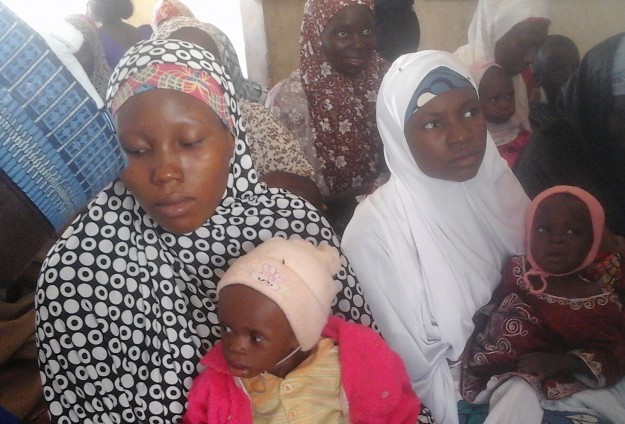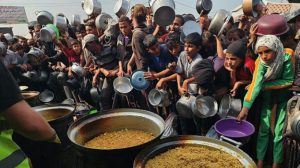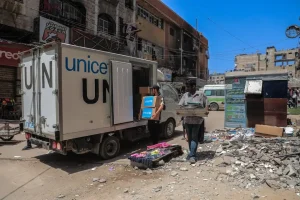Lagos, 5 Dzulqa’dah 1436/20 August 2015 (MINA) – Nigeria has made great improvements in its health sector, with Ebola being defeated and the West African country going a full year without a new polio case – but many basic challenges remain.
At least 1,000 children die of malnutrition in Nigeria every day, making up roughly 55 percent of under-five deaths in the country, according to official data from the country’s statistics bureau, Halal Focus quoted by Mi’raj Islamic News Agency (MINA) as reporting.
In addition to leading to stunted growth and deaths, malnutrition also has a huge impact on national economic growth, Anadolu Agency quoted by Mi’raj Islamic News Agency (MINA) as reporting.
Malnourished children perform poorly at school, are disease-prone and often grow up becoming economic burdens.
Also Read: UN Experts Warn Right Violations in Kashmir by Indian Authorities
Drawing attention to what experts call Nigeria’s “silent crisis,” UNICEF recently held a media dialogue in Kano, northwest Nigeria, on child malnutrition and community management of acute malnutrition (CMAM).
Experts explained the causes of malnutrition, gave statistics of malnourished children across Nigeria and offered solutions such as increasing government funding.
Figures from the 2013 Nigeria Demographic and Health Survey say that 11 million Nigerian children suffer stunting, a key indicator of childhood malnutrition. This figure, cutting across social strata and regions, is the second highest in the world after India.
Maryam Abdullahi is the coordinator of the Yanhawaki CMAM center in Kano, one of several centers operated by UNICEF in the 11 northern states in collaboration with some state governments.
Also Read: At Least Nine Children and One Woman Killed in Pakistani Airstrike on Afghanistan
She told Anadolu Agency that they receive “at least 400 new cases” of malnutrition per week.
At the center, the children are given Ready to Use Therapeutic Food (RUTF) to regain what they lost in nutrients.
UNICEF Chief Nutritionist Dr Arjan de Wagt said that malnutrition accounts for nearly half a million under-five deaths per year.
At least two-thirds of national GDP is also being lost since “productivity losses to individuals are estimated at more than 10 percent of their life time earnings,” he added.
Also Read: Pakistan Condemns Israeli Settler Attacks in West Bank, Al-Aqsa Storming
UNICEF Nutrition Specialist Dr Bamidele Omotola told Anadolu Agency that they have admitted at least one million children into the CMAM program since it was launched in 2009, with $61million being spent on RUTF alone.
It takes at least $274 to treat a malnourished child, Omotola added.
Malnutrition results from people not consuming the right amounts and types of food and essential nutrients, experts say.
A 2013 survey shows that only 17 percent of Nigeria’s 27 million under-fives get exclusive breastfeeding in their first six months of life, the only sure bet to avoid children malnutrition.
Also Read: China Criticizes US-Drafted UN Gaza Resolution as Vague, Abstains from Vote
Nearly four out of five Nigerian children do not meet the World Health Organization’s recommendation for exclusive breastfeeding during the first six months of life and two in every five Nigerian children are stunted, according to official figures.
The Nigerian government and UNICEF announced on Monday that they have reached more than a million malnourished Nigerian children, saving over 200,000 lives in the past six years.
Omotola blamed poor infrastructure, education, belief systems and sociocultural practices for the alarming figures.
He added that breast milk substitutes resorted to by some mothers, “do not have what we refer to as anti-infective properties that are contained in the immune cells which the mother can pass to a child.”
Also Read: Former Bangladesh PM Sheikh Hasina Sentenced to Death
Head of Nutrition for the Federal Ministry of Health Dr Chris Isokpunwu urged all levels of government to increase funding for nutrition and commit to the implementation of “the strategic plan of action for nutrition.”
“We have a five-year plan and over five years it is going to cost about $900 million but we still have a huge gap between what is required in terms of funding,” he told Anadolu Agency.
“We need to vigorously campaign for exclusive breastfeeding in the first six months and breastfeeding continued up to when the child is two-years-old, along with adequate complementary feeding,” he said. “We also need to emphasize proper maternal nutrition, especially during pregnancy, in order to produce well-nourished children.” (T/P010/RO6)
Mi’raj Islamic News Agency (MINA)
Also Read: Pakistan Declares State of War After Car Bomb Incident

































 Mina Indonesia
Mina Indonesia Mina Arabic
Mina Arabic